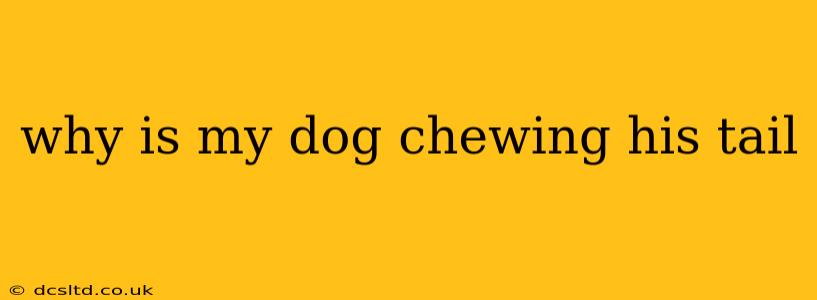Why Is My Dog Chewing His Tail? A Comprehensive Guide
Tail chewing in dogs, also known as tail chasing or self-mutilation, is a common problem that can stem from various underlying causes. Understanding the reasons behind this behavior is crucial for addressing it effectively and ensuring your dog's well-being. It's important to note that persistent tail chewing can lead to serious skin infections, so addressing the root cause is paramount.
This guide will explore the most frequent reasons why dogs chew their tails, offering insights into diagnosis and treatment. We'll also address some frequently asked questions to provide a comprehensive understanding of this concerning behavior.
1. Fleas and Allergies:
One of the most common culprits behind tail chewing is the presence of fleas or allergic reactions. Fleas cause intense itching, and dogs may focus their scratching and chewing on their tails, where fleas often congregate. Allergies to environmental factors (pollen, dust mites) or food can also trigger intense itching and lead to excessive licking and chewing, particularly on the tail. Regular flea treatments and identifying and eliminating allergens through veterinary guidance are essential.
2. Pain or Injury:
A painful tail injury, such as a fracture, sprain, or sting, can cause your dog to chew the area as a way of self-soothing or relieving discomfort. Inspect your dog's tail carefully for any signs of injury, including swelling, redness, or wounds. If you suspect an injury, a veterinary visit is crucial.
3. Anxiety and Stress:
Dogs, just like humans, experience anxiety and stress. Separation anxiety, fear of loud noises, changes in routine, or even boredom can manifest as excessive licking, chewing, or biting. Tail chewing in this context can be a self-soothing mechanism, a way to release pent-up energy or reduce anxiety. Addressing the underlying stressor is key, often through behavioral modification techniques, enrichment activities, or possibly medication.
4. Anal Gland Issues:
Problems with the anal glands can cause intense discomfort and itching, leading your dog to lick or chew at their tail and rear end. If you notice a foul odor, excessive licking around the anus, or difficulty defecating, it's crucial to consult a veterinarian, as anal gland issues require professional attention.
5. Compulsive Behavior:
In some cases, tail chewing can become a compulsive behavior, almost obsessive. This often develops as a coping mechanism for underlying anxiety or stress. These cases can be more challenging to treat and may require a combination of veterinary and behavioral approaches, possibly including medication to help manage the compulsion.
6. Nutritional Deficiencies:
Although less common, nutritional deficiencies can sometimes lead to skin problems and excessive itching, prompting tail chewing. A balanced diet, designed to meet your dog's specific needs, is important for maintaining healthy skin and coat.
How Can I Help My Dog Stop Chewing His Tail?
The best approach depends on the underlying cause. Veterinary consultation is strongly advised to rule out medical conditions. Once the cause is identified, strategies may include:
- Veterinary Treatment: For fleas, allergies, or anal gland issues, veterinary treatment is essential.
- Anxiety Management: Behavior modification techniques, enrichment activities, calming aids, or medication may be necessary to address anxiety-related tail chewing.
- Environmental Changes: Adjusting the environment to reduce stress, providing ample exercise, and ensuring sufficient mental stimulation can make a significant difference.
- Protective Collars: Using a soft Elizabethan collar (cone) or a bitter-tasting spray on the tail can help prevent further chewing while addressing the root cause.
- Dietary Changes: A veterinarian can recommend a suitable diet if nutritional deficiencies are suspected.
What if My Dog is Continuously Chewing His Tail?
Persistent tail chewing warrants immediate veterinary attention. Untreated, it can lead to serious skin infections, wounds, and potentially even the need for amputation. Don't hesitate to seek professional help if your dog's tail chewing is excessive, persistent, or causing visible damage.
When Should I Take My Dog to the Vet?
You should schedule a vet visit if:
- Your dog is excessively chewing their tail and it's causing visible damage.
- You notice signs of injury, redness, or swelling on the tail.
- There's a foul odor coming from the tail or anal area.
- The tail chewing seems to be related to sudden behavioral changes.
- You suspect underlying anxiety or stress.
By understanding the various reasons why dogs chew their tails and taking proactive steps, you can help your furry friend overcome this problem and live a happy, healthy life. Remember, early intervention is key to preventing more serious complications.
